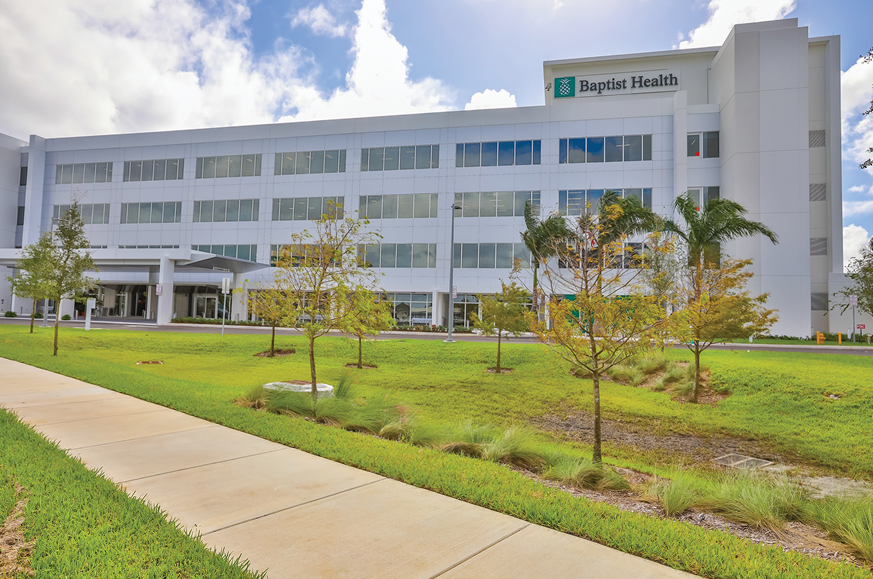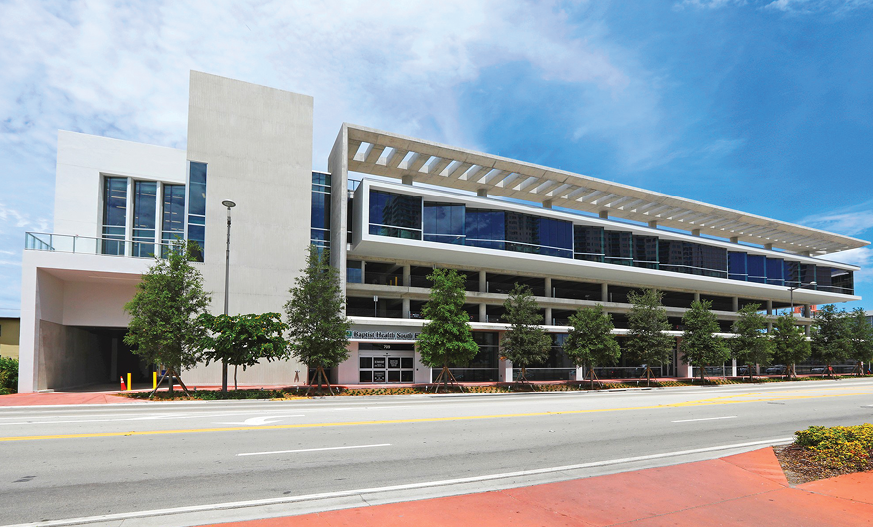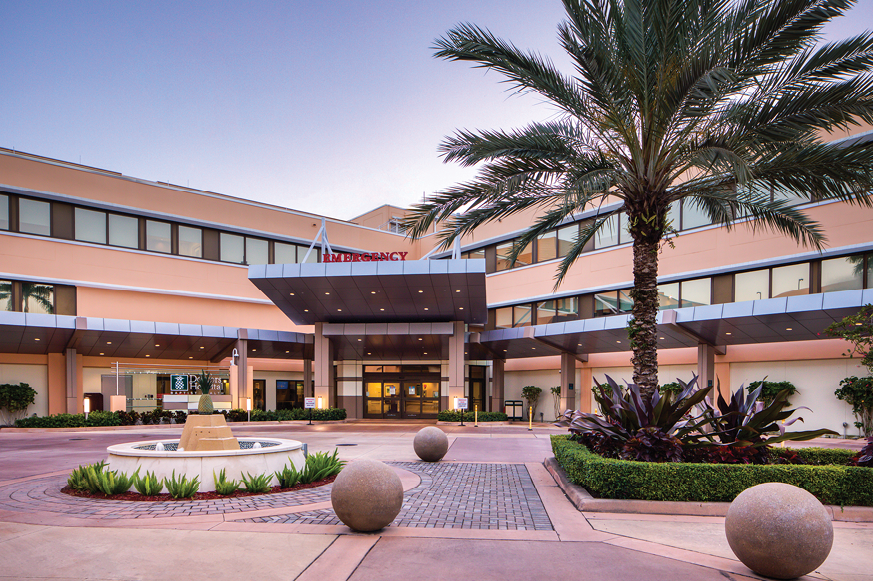- Home
- Media Kit
- Current Issue
- Past Issues
- Ad Specs-Submission
- Ad Print Settings
- Reprints (PDF)
- Photo Specifications (PDF)
- Contact Us
![]()
ONLINE
![]()
ONLINE

Character Revealed
Editors’ Note
Ana Lopez-Blazquez is Executive Vice President, Chief Strategy and Transformation Officer for Baptist Health South Florida, the largest not-for-profit multi-hospital healthcare system in the region, headquartered in Coral Gables, Florida, and Chief Executive Officer of Baptist Health Enterprises, the for-profit subsidiary for Baptist Health. She joined Baptist Hospital of Miami in 1987 as Director of Planning and has led the strategic planning and business/market development functions for Baptist Health since that time. Prior to joining Baptist Hospital, Lopez-Blazquez worked at Orlando Regional Medical Center, a multi-hospital healthcare system in central Florida in various planning and program development positions, where she also completed her administrative residency as part of her graduate studies. She also worked at Blue Cross Blue Shield of Florida in the Provider Audit and Reimbursement Department as a Medicare compliance auditor and audit supervisor for five years. Lopez-Blazquez received a B.B.A. with an emphasis in accounting from Florida International University and an M.B.A. and M.H.S. from the University of Florida.
Organization Brief
Baptist Health South Florida (baptisthealth.net) is the largest healthcare organization in the region, with 11 hospitals, more than 23,000 employees, 4,000 physicians and 100 outpatient centers, urgent care facilities and physician practices spanning across Florida’s Miami-Dade, Monroe, Broward and Palm Beach counties. Baptist Health has internationally renowned centers of excellence in cancer, cardiovascular care, orthopedics and sports medicine, and neurosciences. In addition, it includes Baptist Health Medical Group; Baptist Health Quality Network; and Baptist Healthcare On Demand, a virtual health platform. A not-for-profit organization supported by philanthropy and committed to its faith-based charitable mission of medical excellence, Baptist Health has been recognized by Fortune as one of the 100 Best Companies to Work For in America and by Ethisphere as one of the World’s Most Ethical Companies.
Baptist Health Enterprises (BHE) is the for-profit subsidiary of Baptist Health South Florida which includes all Baptist Health’s real estate holdings. BHE Real Estate and Development Corp., the real estate division within BHE, currently owns and/or manages a diverse portfolio of about 2.8 million square feet of space including a variety of clinical, physician and office tenants. BHE Real Estate and Development Corp. provides full-service property management, leasing, leasing administration/accounting, tenant relations, building engineering and construction oversight and security and centralized surveillance services.

Baptist Health’s wellness and medical complex
in Plantation, Florida
Will you provide an overview of Baptist Health and discuss how the institution has evolved?
Baptist Health South Florida was formed around 1993 which is when we became a healthcare system. At that time, it consisted of one hospital and a very large outpatient division. Subsequent to that, we started to grow by acquisition with our flagship hospital, Baptist Hospital, which had originally opened in 1960, and another one of the hospitals that is now in the system which opened in 1940. Since we have primarily grown by acquisition, we have only built one hospital from scratch that opened about 10 years ago. We are now the largest not-for-profit healthcare organization in South Florida with eleven hospitals, more than 100 outpatient sites, and serving more than one million patients a year.
Baptist Health has a very distinctive logo. It is a pineapple which is the historic symbol of hospitality and this is something that we live and breathe every day. The organization is not only known for its high quality of care and exceptional team of clinicians, but it is also known for its hospitality and service excellence.
With Baptist Health’s growth through acquisition, how critical has it been to build a consistent culture throughout the organization?
It is imperative and culture fit is the very first thing we look for when we approach an acquisition. It starts with the senior leaders and the boards. We have never acquired a for-profit hospital. We look at shared values and a commitment to the community to make sure there is alignment. Our decisions are made with a long-term view and the excess revenue that we make over expenses is used to reinvest back into the community and to provide access to care.
You mentioned the pineapple logo for Baptist Health. Will you discuss the focus on hospitality and service throughout the system?
This starts with hiring the right people. You can teach people a skill, but you can’t teach fundamental compassion and kindness which is non-negotiable for us. The president of Baptist Health, Brian Keeley, has a “no jerk” policy and he does not tolerate poor leadership. It comes down to the basics, blocking and tackling, and not losing sight of who you are.
Will you highlight how Baptist Health has addressed the pandemic and the way the Baptist Health team has performed during this difficult time?
There are no words to capture the commitment, selflessness and teamwork that we have seen. We have an internal campaign that talks about character revealed, since during crisis character is not shaped, it is revealed. We have nurses who very early on in the pandemic, before we really understood how the virus was transmitted, actually refused to leave the patient’s side because of their commitment to care for the patient and the emotional bond that they formed. Patients did not have access to their families and were dying alone and it was devastating. The way that our people have responded has been amazing. We have brought in nurses from other places to supplement our front line workers and were able to move staff to address the surges in different locations. We immediately pivoted to telehealth to be able to provide through technology the ability to not delay care. We put in place the highest protocols for safety and have on staff a number of experts on infectious disease. Our staff that are responsible for the environment of care went above and beyond to make changes to physical facilities. It is a special feeling to be a part of this organization that revealed its character during this crisis.

The Baptist Health facility in Miami Beach, Florida
How critical is it for Baptist Health to be engaged in the community?
We are a community. As a faith-based, not-for-profit institution, there is no question about what we are here to do – we are here to serve the community. Our earnings are put back into the community and we provide a significant amount of free care for those that are not able to pay that adds up to at least $300 million a year for people in need. We are focused on wellness since it is not only about being a place that you come to when you are sick, but also about keeping people healthy. We have a number of community-facing programs about nutrition, exercise and other health factors in order to engage the community and to let them know that we are not only here for them when they are sick, but also when they are well. Baptist Health is an asset to the communities it serves.
Will you highlight Baptist Health’s commitment to diversity and inclusion?
We do not have to look very far since South Florida is very diverse and we hire based on skill and fit. We have over 23,000 employees and have been recognized for the diversity of our workforce. We recognize that it is not just about hiring diverse talent, but that you need to have internal forums for conversation and education in order to make sure that the organization is also inclusive. This is a part of our values.

Doctors Hospital in Miami is also home to
Miami Orthopedics & Sports Medicine Institute, a
Center of Excellence at Baptist Health
Do you feel that there are strong opportunities for women to grow and lead in the industry?
Healthcare is very traditional. When I started in healthcare roughly 40 years ago, it was very clear that the women were nurses and the men were doctors, and the leadership roles were filled mostly by men. That has changed over time and I am an example of this. We also have female CEOs leading a number of our hospitals as well as our outpatient division. There is opportunity for women to continue to make a mark in healthcare and to pursue non-traditional roles in the industry. More than half of the physicians now coming out of training are women and they are pursuing all specialties.
What has made healthcare so special for you and an industry where you have wanted to spend your career?
My undergraduate degree is in accounting and I worked in a hospital while going to school, in the Dietary department, processing food orders and typing menus. When I finished school, I went to work as a compliance auditor for an insurance company that audited hospitals, so I was already working in the healthcare industry. I really enjoyed it and while I never wanted to be an operator running a hospital, I wanted to be in strategy to help shape a vision which is what I have had the privilege of doing at Baptist Health. I have been here for 33 years and what has kept me at Baptist Health are the people who I respect and admire, and when I see what we have done in the community, it is a source of pride for me to say that I am a part of this organization. ![]()